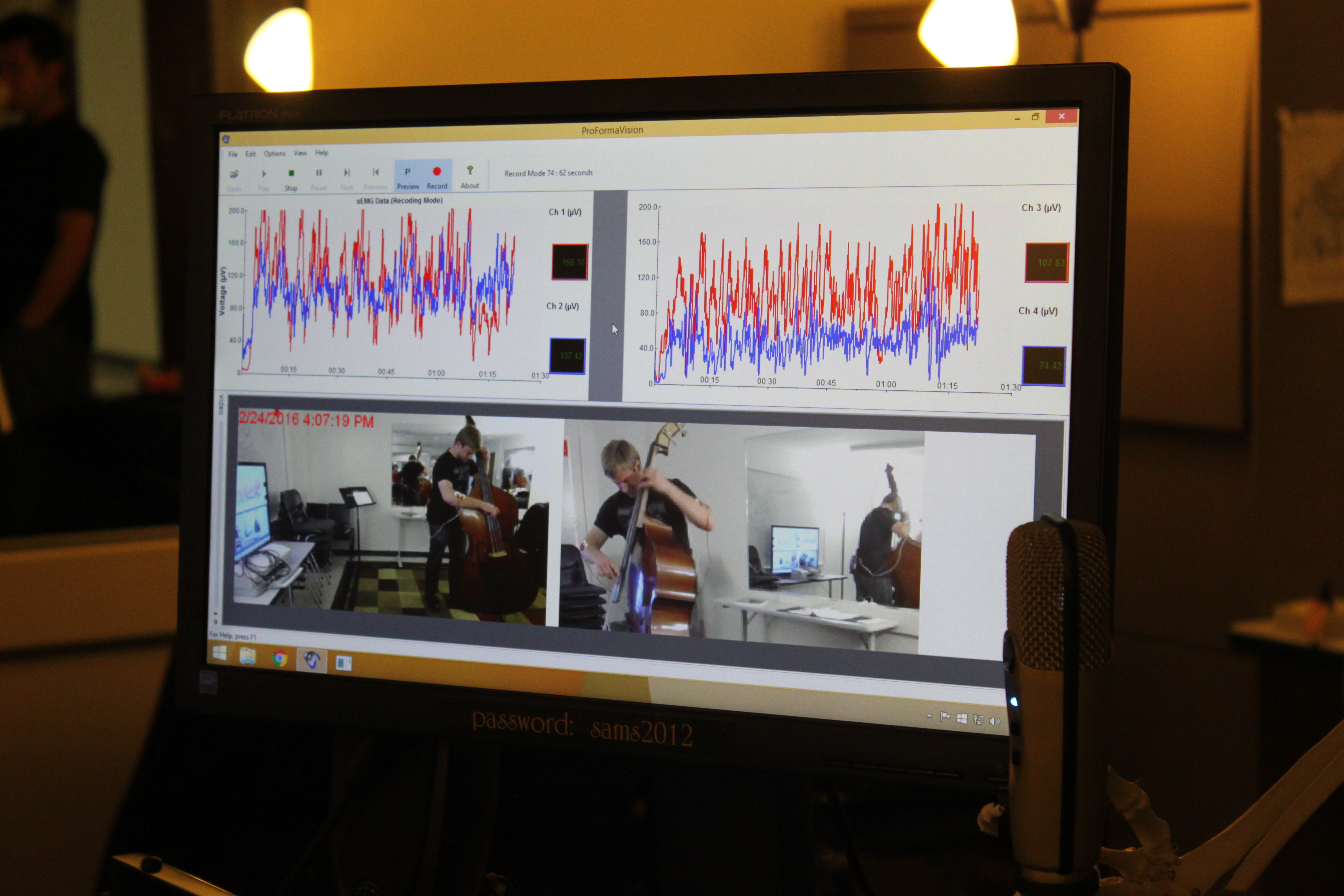Directors:
Assistant Coordinator: TBA
Lead Lab Assistant: Open
Lab Assistants:
Ana Adame, Justin Lide
Appointments for individuals or pairs
Lab hours for Fall 2025
Mondays: 11 AM - 12:30 PM
Wednesday: 10 - 11 AM and 3 - 4 PM
Thursdays: 3 - 4 PM
Fridays: 11AM - 12:30 PM
Prior to your appointment, please complete an intake form — see PSC Lab door.
Additional hours available by appointment with Dr. Watson![]()
Description and Lab Mission
The Performance Science Centre (PSC) Lab in the School of Music, California State University, Fullerton, is an applied research facility whose mission is dedicated to improving musical performance efficiency and pedagogical efficacy by and for students and faculty members of the School of Music.
This uniquely innovative facility sets our School of Music apart from all other conservatories, schools of music, and music departments at undergraduate or graduate music programs in the state of California, according to a recent accreditation review by NASM.
We currently use the PSC lab for helping our students find more efficient ways of making music and becoming more aware of how their body and mind function during performance. While our focus is upon music making and musicality, our approach is based on scientific principles and research methodologies.
Each semester, we either conduct an applied research study of our own, or work in tandem with student and faculty researchers from other departments, or other institutions. We are currently comparing the performance effects of an ergonomically designed orchestral musician’s chair with the standard chairs used in our major ensembles. This will have ramifications not only for musicians, but also for those who administer music performance ensembles, schools, and venues.
Our ProFormaVision technology allows us to record musical performance (video and audio) and muscle tension-release patterns (graphic displays) simultaneously, with stop motion or in real time. This carries tremendous pedagogical value, as it allows one to optimize the use of one’s body during performance and find previously unknown sources of muscular inefficiency. The use of our HeartMath HRV monitors likewise is useful in training musicians how to increase coherence of the sympathetic and parasympathetic nervous systems which can influence cognitive performance and emotional experience. Invaluable for teaching and performing musicians.
Music faculty members are encouraged to use the lab with their studios, either in the private setting or during a studio workshop. We are happy to provide personnel to facilitate or to train in the use of the technology.
Workshops by presenters from a variety of disciplines and foci occur throughout the academic year.
PSC Lab Services:
ProFormaVision – Surface electromyography (sEMG) biofeedback for performance and pedagogical improvement (instrumental, vocal, keyboard, conducting).
HeartMath Monitors – Heartrate variability monitors (HRV) for performance and pedagogical improvement, and emotional – cognitive coherence for all musicians.
VoceVista – Electroglottograph for performance and pedagogical improvement for singers.
Workshops – Presentations for applied music studios or classes relating to movement disciplines, neuroscience in practice and performance of music, body mapping, avoiding injury and returning from non-practicing, mental clarity and acuity, music performance anxiety, ergonomics, etc.
Consultations – Individual or small group questions regarding practical matters, peak performance, research study development.
Independent Study – Based on curricula developed in 3 areas (1. Applied Psychology for Peak Musical Performance; 2. Applied Anatomy & Physiology for Musicians; 3. Musicians’ Performance Wellness & Health), or other areas of student interest.
Training – For CSUF students and faculty, use of technology in the PSC Lab, and other resources, for analyzing performance and pedagogy.
Guest Presenters – The PSC Lab has been the location and impetus for guest presenters such as Dr. Kathleen Riley, Jerald Schwiebert, Dr. Lynn Helding (USC), Dr. Molly Gebrian (NEC), Dr. Janice Ying (DPT, Colburn School / USC-Keck), Lynn Charlton (Alexander Technique), Benj Kanters (“Hear Tomorrow” musicians’ audiological health), Dr. Barbara Lister-Sink (Salem College), Kay S. Hooper (body mapping), Dr. Barbara Fast (Univ. of Oklahoma), etc.
Lab Components
We are fortunate to have the first type of facility like this on the west coast. Our current setup consists of a Yamaha N1 Avant Grand, Proformavision, VoceVista, an Infiniti System for measuring heart rate and breathing, a number of anatomical models, posters and books, and a 50” flat screen to project real-time results during class demonstration settings.
Our extensive and ever-growing library is full of resources that cover everything from Alexander Technique to human anatomy, to performance techniques for a variety of instruments.
Important Additional Links:
www.vocevista.com (electroglottograph for singers)
www.thoughttechnology.com (Infiniti)
https://www.heartmath.com (heartrate variability technology)
https://bulletproofmusician.com (Noa Kageyama, PhD, Bullet Proof Musician, “The Science (and Art) of Peak Performance”)
Surface electromyography (sEMG) Requirements
Wear comfortable, loose-fitting clothing, so that electrodes can be placed on the trapezius muscle group area, as well as flexors or extensors of the forearms (instrumentalists, conductors and keyboard players). If you are an instrumentalist, we ask that you bring your instrument with you to the session. Visitor Information


